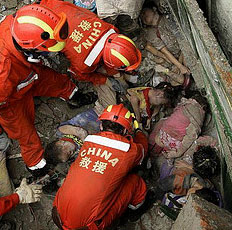In a Beijing News editorial written on January 15th, Shi Jia writes that the quick Chinese response to Haiti’s earthquake had to do with empathy and the fact that just a little over a year ago, Chengdu went through the same thing.
China responded quickly to Haiti’s earthquake, sending a team of 50 rescuers and sniffer dogs to Port au Prince on the 14th and announced the first shipments of more than 3 million yuan in aid to Haiti on the 16th.
In last Saturday’s China Daily, the devastation in Haiti was front page news and an editorial reiterates Shi Jia’s point:
The suffering of people anywhere in the world strikes a chord in the hearts of Chinese people. The death of four Chinese peacekeepers in Haiti has little to do with it. Chinese people feel a special sympathy for Haitians because just less than 20 months ago they were struggling to rise from the debris of one of the biggest quakes in human history.

Comparisons with the quake in Chengdu that killed at least 80,000 people will find that, although the tragedy here in Sichuan was horrific and scarred the region forever, what is happening today in Haiti might prove to be even more devastating. Chengdu is a provincial capital and the quake didn’t actually damage Chengdu too much; by comparison, the quake in Haiti destroyed the capital, decapitated the government, and killed the top UN officials in Haiti at the time. In this NYT article, the frustration of aid workers from around the world is palpable:
There are 200 flights going in and out every day, which is an incredible amount for a country like Haiti,” said Jarry Emmanuel, the air logistics officer for the agency’s Haiti effort. “But most of those flights are for the United States military.
He added: “Their priorities are to secure the country. Ours are to feed. We have got to get those priorities in sync.
China didn’t require quite as much synchronization. There was very little looting or violence in Sichuan after the quake and the nation responded at once and as one to provide aid, clear roads, re-build bridges and establish a systematic relief program that kept frustration and death at bay. Haiti, by contrast, is a poor, corrupt country barely able to stand on its own two feet without the UN at its elbow. The State of Haiti’s problems were legion before this quake even hit — the country is known around the world as a violent, hot bed of AIDS and refugees with little or no economy. In terms of infrastructure, Haiti is on par with Somalia — tragically confirmed by bulldozers piling the bodies or earthquake victims into dump trucks.

In comparison, northern Sichuan in 2008 was a backward, poverty stricken region with corrupt local officials cashing in on infrastructure funds meant to develop the area, but the State functioned. Roads worked, there were no violent gangs and people could go about their daily lives in a normal fashion. In China, the quake was pragmatically viewed by some as a chance to re-build the region from scratch with central government (and private) funds and a clear and unambiguous program of reconstruction supervised by authorities in Chengdu and Beijing. An earthquake in Haiti turns the entire country into chaos, whereas an earthquake in China is a showcase for a nation’s unity.
One thing to look for in the months ahead is how Haiti (and the world) responds to the glaring inadequacies of the Haitian infrastructure and government. Will Haiti be rebuilt stronger than before? Will the Haitian people unite under a banner of common suffering, or tear each other apart in order to survive?
China routinely pats itself on the back for the nation’s response to the May 2008 quake, but refuses to publicly address the issue of “tofu engineering” that was allegedly responsible for the collapse of hundreds of schools and the deaths of thousands of young children.
Haiti does have one thing on its side: there’s nothing to hide and the people have no illusions concerning the shortcomings of their state.
What do you think?
To read more about the Sichuan earthquake, check out: The Ace of Diamonds
Hopefully the US is doing everything its power to assist in the recovery. Haiti really needs a lot of help – like Sichuans earthquake, this is really tragedy on an unimaginable scale.
“An earthquake in Haiti turns the entire country into chaos, whereas an earthquake in China is a showcase for a nation’s unity.” This seems to be the paramount difference between this disaster and the Sichuan earthquake. Tough break for Haiti.